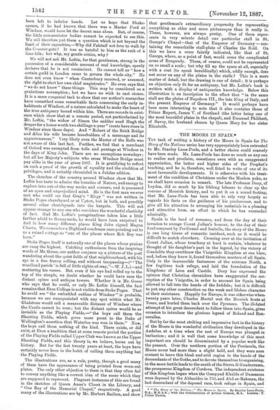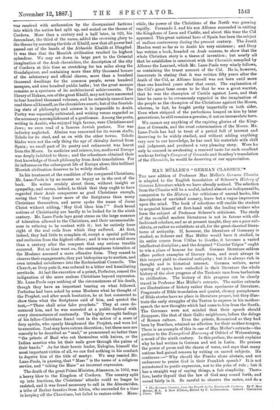THE MOORS IN SPAIN.* Tuz task of writing a history
of the Moors in Spain for The Story of the Nations series has very appropriately been entrusted to Mr. Stanley Lane-Poole, and a better choice could scarcely have been made. Mr. Lane-Poole has done as much as any one to realise and proclaim, sometimes even with an exaggerated appreciation, the better and higher sides of the Prophet's teaching, and he is, therefore, well fitted to write of one of its most favourable developments. It is otherwise with his treat- ment of the condition of Christians under the Moslem yoke, as we shall have occasion to remark. The late Professor Dozy, of Leyden, did so much by his lifelong labours to clear up the sources of Moorish history, and to put it on a sound footing, that Mr. Lane-Poole has been able to rely very largely as regards his facts on the guidance of his predecessor, and to give all his attention to arranging his materials in a pleasing and attractive form, an effort in which he has succeeded admirably.
Spain is the land of romance, and from the day of their invasion to avenge Count Julian's honour, to the day of their final conquest by Ferdinand and Isabella, the story of the Moors is one long tissue of romantic incident, such as it would be difficult to match elsewhere. Crossing over at the invitation of Count Julian, whose treachery at least is certain, -whatever be thought of his daughter's part in the legend, by the victory of Guadalite they overthrew the Visigothic Kingdom at one blow, and, before they knew it, found themselves masters of all Spain. Only in the inaccessible fastnesses of the extreme North, a few fugitives took refuge, and laid the foundation of the Kingdoms of Leon and Castile. Dozy has expressed the opinion that Christian chroniclers have exaggerated the cor- ruption of the Visigoths, in order to account for Spain being allowed to fall into the hands of the Infidels; but it is difficult to put any other construction on the weak and lifeless character of their resistance. Happily for Europe, it was otherwise when, twenty years later, Charles Martel met the Moorish hosts at Tours, and hurled them back over the Pyrenees. The ill-fated attempt of his great descendant to follow them into Spain, gives occasion to introduce the glorious legend of Roland and Ron- cevalles.
But by far the most striking and impressive fact in the history of the Moors is the wonderful civilisation they developed in the Andalus, at a time when the rest of Europe was plunged in barbarism ; and it is well that some knowledge of this most important era should be disseminated by a popular work like the present. Over the northern portion of the Peninsula, the Moors never had more than a slight hold, and they were soon content to leave this bleak and arid region in the hands of the descendants of the Goths. and to devote themselves tciorganising, in the more fertile lands to the south of the Sierra di Guadarrama, the prosperous Kingdom of Cordova. The independent existence of this Kingdom began when the Omeyyad Khalifs of Damascus were deposed by the Abbasides in 750, and Abd-er-Rahman, the last descendant of the deposed race, took refuge in Spain, and
•
"Oh, Story of the Notions i" The Moore in Spain. By Stanley Lano-Poole, ILA., M.R.A.S. ; with the Collaboration of Arthur Gilman, M.A. London: T. Fisher 17nwin.
was received with acclamation by the disorganised factions into which the nation had split up, and seated on the throne of Cordova. More than a century and a half later, in 929, his descendant, the third of the name, added the crowning glory to the throne by assuming the title of Khalif, now that all power had passed out of the hands of the Abbasid° Khalifs at Bhagdad. It was then that the Moorish civilisation reached its highest splendour. We may set down in large part to the Oriental imagination of the Arab chroniclers, the description of the city of Cordova at this time as stretching for ten miles along the Guadalquiver, and containing more than fifty thousand houses of the aristocracy and official classes, more than a hundred thousand dwellings for the common people, seven hundred mosques, and nine hundred public baths ; but the great mosque remains as a specimen of its architectural achievements. The library of Hakam, son of the great Khalif, may not have amounted to four hundred thousand volumes, and he certainly cannot have read them all himself, as the chroniclers assert; but of the flourish- ing state of philosophy and science it is impossible to doubt. Poetry was especially cultivated, and writing verses regarded as the necessary accomplishment of a gentleman. Among the poets, writing in Arabic, who enjoyed high favour, were Christians and Jews ; we even read of a famous Jewish poetess. Nor was industry neglected. Almina was renowned for its woven stuffs, Toledo for its steel, and so on with the other towns. Toledo blades were not the only thing the age of chivalry derived from Spain ; no small part of its poetry and refinement was learnt from the Moors. In medicine and science, too, medireval Europe was deeply indebted to them ; and the schoolmen obtained their first knowledge of Greek philosophy from Arab translations. For its influence on the subsequent life of Europe alone, this brilliant Moorish civilisation deserves to be widely studied.
In his treatment of the condition of the conquered Christians, Mr. Lane-Poole is by no means so happy as in the rest of the book. He writes crudely about them, without insight or sympathy, and seems, indeed, to think that they ought to have regarded their Arab conquerors as good Christians enough, seeing that " they knew more of the Scriptures than many Christians themselves, and never spoke the name of Jesus Christ without adding, 'May God bless him !' " Such broad notions of Christianity are hardly to be looked for in the ninth century. Mr. Lane-Poole lays great stress on the large measure of toleration allowed to the Christians, and their unreasonable- ness in refusing to be content with it ; but he entirely loses sight of the real evils from which they suffered. At first, indeed, they had little to complain of, except a special poll-tax and exclusion from the highest offices; and it was not until more than a century after the conquest that any serious trouble occurred. But as time went on, the contemptuous toleration of the Moslems assumed a more offensive form. They ceased to observe their engagements, they put bishoprics up to auction, and even intruded unbelievers into the Ecclesiastical Councils. The Church, as Dozy puts it, was reduced to a bitter and humiliating servitude. At last the execution of a priest, Perfectas, roused the indignation of the more zealous Christians beyond repression. Mr. Lane-Poole says nothing of the circumstances of his death, though they have an important bearing on what followed. Perfectas had been asked by some Moslems what he thought of the Prophet, and after much hesitation, he at last consented to show them what the Scriptures said of him, and quoted the text,—" There shall arise false prophets." They at once de- nounced him, and he was executed at a public festival with every circumstance of contumely. The highly wrought feelings of his fellow-Christians found vent in the action of a score of fiery spirits, who openly blasphemed the Prophet, and were led to execution. Zeal may have outran discretion ; but these men are scarcely to be described as "mad," or pronounced no better than "the priests of Baal who cut themselves with knives, or the Indian ascetics who let their nails grow through the palms of their hands." As for their heroic leader, Eulogies, himself the most important victim of all, we can find nothing in his conduct to deprive him of the title of martyr. We may remind Mr. Lane-Poole, in passing, that " Mass " is the name of a religious service, and "taking the Mass" an incorrect expression.
The death of the great Prime Minister, Almanzor, in 1002, was a heavy blow to the Kingdom of Cordova. The country split up into fractions, the Christians' attacks could no longer be resisted, and it was found necessary to call in the Almoravides, a tribe of Berber fanatics from Africa, who succeeded for a time in keeping off the Christians, but failed to restore order. Mean-
while, the power of the Christians of the North was growing rapidly. Fernando I. and his son Alfonso succeeded in uniting the Kingdoms of Leon and Castile, and about this time the Cid appeared. This great national hero of Spain has been the subject of endless controversy during the present century. The Jesuit Masden went so far as to doubt his very existence ; and Dozy has written a book, founded on Arab sources, to show that the whole Christian story is a tissue of invention ; bat nearly all that he establishes is consistent with the Chronicle compiled by Alfonso the Learned, which Mr. Lane.Poole very wisely follows, as containing the truest account of the Cid. He is, however, inaccurate in stating that it was written fifty years after the death of the Cid, as Alfonso himself was not born until more than one hundred years after that event. The explanation of the Cid's great fame seems to be that he was a great warrior, that he was the champion of Castile against Leon, and that later he came to be erroneously regarded in the imagination of the people as the champion of the Christians against the Moors, whereas, in fact, he fought pretty impartially on both sides. Even when stripped of the perfections heaped on him by later generations, he still remains a genuine, if not an immaculate hero.
We cannot say anything of the expiring glories of the King- dom of Grenada, and the cruel extermination of the Moors. Mr. Lane.Poole has had to treat of a period full of interest and deserving to be widely studied, and without adding anything very new to our knowledge, he has used his materials with skill and judgment, and produced a very pleasing story. Were he only to succeed in awakening a renewed taste for such excellent works as Irving's Conquest of Grenada and Sonthey's translation of the Chronicle, he would be deserving of our appreciation.

































 Previous page
Previous page